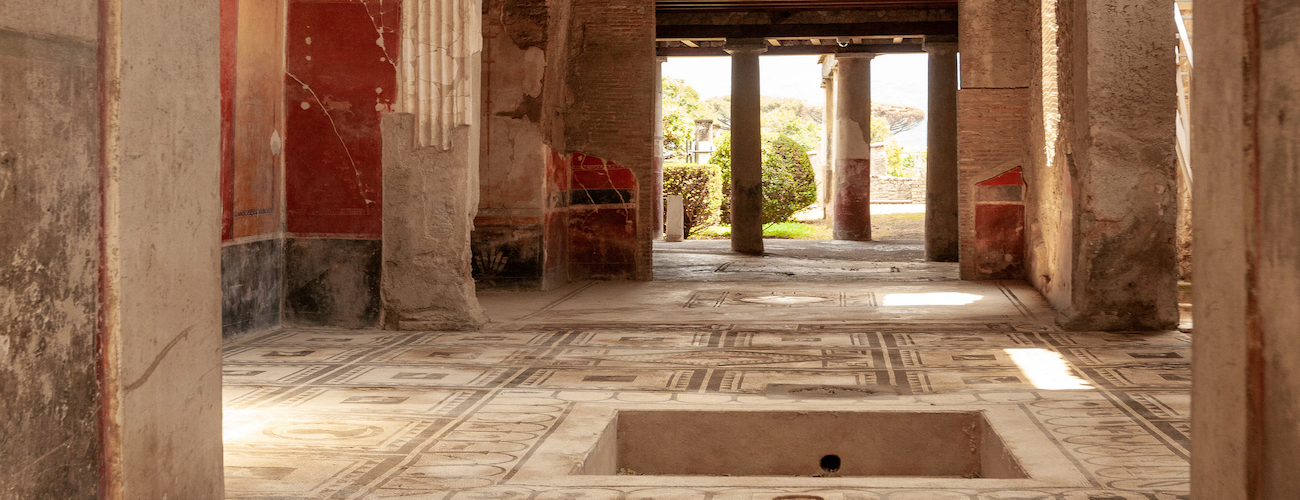The House of the Deer

A recent visit I took as a tourist led by a British archaeologist guide was helpful regarding contrasts at Pompeii and Herculaneum. What fascinated me is how Herculaneum residents might have considered the cessation of hot stone showers the end of the eruption. Why not? They couldn’t know that later that night Vesuvius would send at least four pyroclastic flows that would boil brains. I was struck with the boathouses, where skeletons, gold jewelry, and oil lamps are still huddled together, as they were that night, not expecting anything but a morning escape.
The House of the Deer focuses on a wealthy family. In a fictitious villa, a family is ordered to flee to the beach amidst hot stone showers of debris and pumice. The gold-loving Romans grab jewels and coins before rushing to fishermen’s boathouses. They actually tread on people caught in the trampling confusion. Another irony emerges as the boiling heat extinguished lives more quickly than burial by pumice. I incorporated the fact that carbonized remains of a wooden boat were found on the beach. As archaeology discoveries at such sites expand in our time, historical knowledge is enriched and verified.
Herculaneum, Italy, 79 A.D. and later
Julius, do you recall a flowery scent wafting
on the balcony when you returned from
the boathouses? Slaves braided
the seafront colonnade with red roses.
Ah, Cecilia! I’m glad to be back!
The sweet aroma made me dizzy; I leaned
into your arms. Lucius ran from the baths,
happy to see his father, exclaiming:
High waves in the pool! How could we
have known. . . that was a sign?
At that second the world changed.
Shudders, shattered glass, shimmying walls,
mad drummer on the roof. Walls, floor, shook.
Shouts above the roar: Julius, Caecilia,
Lucius, slaves, everyone: to the beach!
My father’s order.
Slaves tied pillows to our heads. I grabbed
gold jewelry, Lucius, his coins, you, two
or three oil lamps. Dash to the street.
The sun was dead.
Curtains of shards spawned a carpet
of pointed tuff. Half-blinded by dust,
we plowed ankle-deep, slowed by a prickly
crunch of hot stones —
shovelfuls into a mass grave.
We stumbled on neighbors, relatives.
Was that cousin Calpurnia? No time
to stop. Pillows slipped, fell off.
Torches pranced like fireflies.
Then nothing.
Fortuna smiled: we reached the beach,
clambered into a boathouse. Oars,
torn sails, tangled nets, fishy smell.
Fear united us.
That night we listened to the throes of our
dying city — splintering statues, splitting timbers,
dissonant cries — human, animal. Someone wept.
Stones ceased. Our world a quiet cavern.
No stars dared come out.
You, dear Julius, assured our safety:
We can all leave Herculaneum by sea at early light:
Rest tonight for the journey. Uncle Claudius
readied his boat. No one said so, but some
planned a swim to safety.
Memory of home: a lullaby of bubbling
water from Neptune’s fountain in lush greenery.
I reminded Lucius to soothe him. We hoped for sleep.
Last chance to dream.
Vulcan tricked us. Surprise. At dawn, a hot hiss
of whirling, twirling, churning sand. Boiling heat
consumed us. No time or space between
life’s end, death’s beginning.
Hardly anyone was left alive in Herculaneum to be
awakened by screams from the boathouses, as a giant
ball of superheated gas boiled blood and brains.
A quick death. Today, mounds of eyeless heads,
lamps, jewelry, lie in the arched niches. About
152 individuals were found in six of the 12
boathouses. Adult women, infants and children
outnumbered men by about two to one. A wooden
escape boat, carbonized on sand, near bones of those
who dared to swim, resides in the city’s museum.
Acknowledgement
I would like to thank archaeologist Kristina Killgrove for her encouragement and introduction to Epoiesen.
Cover Image by Daniel Lloyd Blunk-Fernández via unsplash.com
Masthead Image by Yaopey Yong, via unsplash.com